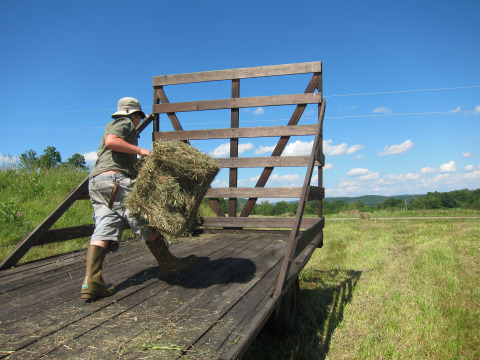What is Work?

The boys loaded bales whilst I slept off my morning drunk in the shade
I’m reading a book called the Continuum Concept. It was first published in ’86, way back when I spent most of my time smoking weed and trying to play Eddie Van Halen riffs on my guitar (for the record, I no longer do at least one of these things), so it’s possible some of you have heard of it or even read it.
Anyway. The book chronicles the author’s experiences living with indigenous cultures in the jungles of South America, and how these experiences transformed her perceptions of what constitutes a meaningful life and how we should relate to one another and our children. At least, that’s what I’m getting out of it so far: I’m only on about page 40.
Still, already I’m struck by her observations regarding tribal attitudes toward tasks Westerners would likely consider onerous, inconvenient, or downright miserable. She talks about participating in some of these tasks – hauling water, or sugarcane, or portaging boats – and how when faced with these tasks, her mood invariably became bleak and complaining. These jobs were hard. The rocks hurt her feet. The water was heavy. The path was narrow and steep. And so on. Yet, when she looked around her, all she saw were smiles. All she heard was laughter and joking. There was no sense of urgency, no tension in body, face, and action. It was if the hard work was not actually hard work, at all. It was as if it was just life. It was if her experience of these tasks being unpleasant resulted not from the tangible particulars of the job at hand, but from her socialized expectations relating to labor. They were of her mind, not her body.
Every so often someone says to me “I can’t imagine how hard you must work to do what you do.” I never really know how to respond. I mean, yeah, I guess we do work hard (though I’m keen to point out, not nearly as hard as the good people I wrote about yesterday). Over just the past few days, I think of haying: 95 degrees and humid as a submarine with an open sunroof. Late first cut, which might just be the itchiest, scratchiest substance known to humankind. You want to get a secret outta someone? Forget tickling: Rub the poor bastard down with late first cut. He’ll be singing like a rooster at the break o’ day.
Or splitting wood. We split by hand, a half-dozen or so cords each year, literally thousands of swings with the maul, literally thousands of wedges of firewood to be hauled and stacked. How many tons of wood moved per year? How many splinters?
Or killing pigs. Or even just this morning, in the field by 5:15 while my family dozes, setting up fence and hauling feed to the meat birds, the sun not even yet threatening full daylight.
Do we whistle and sing and laugh through every one of these tasks? Of course not. Just the other evening, I lay under the tractor, cursing and wallowing in self pity as I methodically removed the skin from my knuckles trying to fit a wrench to the bolts that hold the front axle assemble to the motor. They had somehow come alarmingly loose, creating the discomfiting sensation that the beast was about to collapse in on itself. Which, in fact, it was. But the truth is, I rarely think of our homestead tasks as being anything but pleasurable, anything but one of the greatest privileges of my life.
What is work? Our culture seems to equate work with labor, and likewise seems to revere labor avoidance technologies and conveniences. It’s not that we don’t embrace some of these technologies on our small holding: The very fact that we own a tractor is evidence of that. But reading the Continuum Concept reminds me that our perceptions of work – and in particular, labor – are just that: Perceptions. In other words, how we think of the these tasks, whether we consider them bothersome or whether we view them merely as something that needs to be done, and furthermore, that we are blessed to have the opportunity to do, informs the attitude and spirit with which we approach them.
The underlying question that begs asking is how have we come to have such an unfavorable view of labor? And how we might shift that view?
I’ve got some ideas, but they’ll have to wait for another day. Because, you know, I’ve got work to do.

Ben Hewitt's Blog
- Ben Hewitt's profile
- 37 followers



